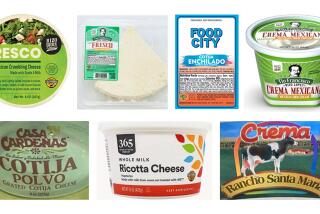Chicken Rancher Has Bone to Pick Over New USDA Order
SEBASTOPOL, Calif. — Rocky the Range Chicken has been ordered by the U.S. Department of Agriculture to become de-ranged, and its owners are squawking.
For five years, Bart and Patricia Ehman’s Pine Ridge Ranch, perched atop a hill dotted with 60-year-old apple orchards in rural Sonoma County about 65 miles north of San Francisco, has been shipping chickens under the Rocky the Range Chicken label. The Ehmans boast that “Rocky is raised on a vegetarian diet and allowed to run outdoors in a stress-free environment.”
They contend that raising the birds this way makes them juicier and tastier than commercial birds that remain cooped up for their few short weeks on earth and get frequent injections of antibiotics.
Despite selling for a hefty premium over standard chickens, Rocky “free-range” birds have become popular with many upscale restaurants and groceries. The Ehmans lately have been hoping to expand distribution in Los Angeles and San Diego.
Enter the USDA, which, after a review of several months, decreed that as of last Monday the couple could no longer use “range” or “stress free” on their Rocky labels.
The Ehmans fear that the change threatens their young business because they won’t be able to tell potential customers about the special merits right on the package.
But the USDA maintains that “ill-defined terms” can mislead consumers and that the government would be unable to verify the accuracy of such claims, according to Jim Greene, a spokesman for the agency’s Food Safety and Inspection Service.
“There are probably about half a dozen terms that we don’t allow on meat and poultry products,” he added. “What’s the use of having something on a label that can’t be enforced?”
Ehman (pronounced ee-man) has vowed to pick this bone with the highest agricultural authority in the land, Agriculture Secretary Clayton K. Yeutter, possibly with backing from what Ehman called farming rights groups.
As a stopgap measure, the Ehmans printed a wanted poster to explain the labeling changes to clients. It features their cartoon character logo of Rocky the Chicken--alias Rocky the Range Chicken--sporting cowboy hat, boots and pistol.
The Ehmans process only 20,000 or so chickens a week, making their company a bantamweight contender among U.S. poultry companies, which together process 90 million chickens weekly.
But Meat & Poultry magazine, a frequent critic of the free-range chicken industry, said large producers have increasingly put pressure on the USDA because they feel that smaller companies’ claims make mainstream birds seem tainted.
Alice Waters, owner of the well-known Berkeley restaurant Chez Panisse, said she thinks that labeling is an important issue.
“People have to know what these things mean,” she said. Her restaurant recently stopped buying Rocky birds in favor of chickens raised in very small numbers on the Research Farm near Davis. The birds there are moved outside each morning in good weather and eat grass, bugs and whatever else they find.
Other observers see the squabble as much ado about nothing much.
“I don’t think that one word should make a difference,” said restaurateur Wolfgang Puck, who urged Ehman five years ago to develop a range chicken and still occasionally serves Rocky brand chicken at his Spago eatery in Los Angeles.
Puck is familiar with the vagaries of government regulations. Two years ago when he decided to sell his “designer” pizzas in supermarkets, the USDA said he could not call them pizzas because they didn’t contain tomato sauce. Puck said he got around the problem by applying “an espresso spoonful” of tomatoes to each pie.
In Southern California, Rocky birds are sold at Gelson’s and Mrs. Gooch’s (which Ehman inexplicably refers to as Mrs. Goochie’s, perhaps confusing it with the tony Italian design house). Gelson’s in Century City this week quoted a price of $2.49 a pound for a Rocky fryer, compared to $1.49 per pound for a Zacky Farms bird.
Sales of Rocky birds and a smaller counterpart, Rocky Jr., are projected this year at between $5 million and $6 million.
Raised by Petaluma Poultry Processors to the Ehmans’ specifications, Rocky the Chicken has indeed been very good to Ehman, 49. He tools around from ranch house to chicken ranch in a new silver Mercedes-Benz 560 SEC, and he and his wife recently built a white house on a 113-acre property.
“Land up here is scarcer than hen’s teeth,” Ehman said with a straight face. “We were lucky to find it.”
Ehman, who said his real love is fishing, acknowledges that he sometimes has difficulty getting visitors to grasp the “range” concept, especially during winter when the birds tend to flock together near the feeders inside their plywood and chicken wire houses rather than wander about outdoors.
On Tuesday afternoon at one chicken ranch in nearby Santa Rosa, intermittent showers kept all but one game Rocky from venturing out. Clearly, these fair-weather fryers have figured out that they are more at home on the range when it’s warm and sunny, even if they are, as Ehman puts it, “not much more intelligent than grass.”
“We don’t make them go outside,” he noted, indicating that forced marches would scarcely qualify as “stress-free” conditions.
Ehman said a legal challenge is a possibility. Said he with more than a hint of defiance, “The government might shut us down from all the hell we’re raising.”
More to Read
Eat your way across L.A.
Get our weekly Tasting Notes newsletter for reviews, news and more.
You may occasionally receive promotional content from the Los Angeles Times.










